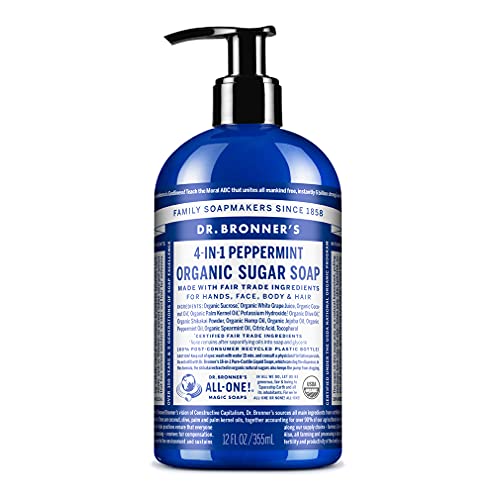
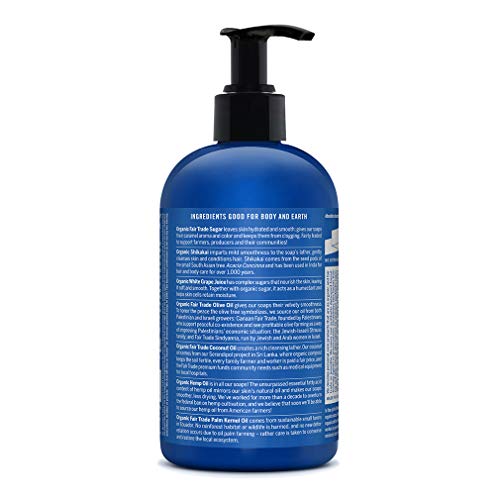
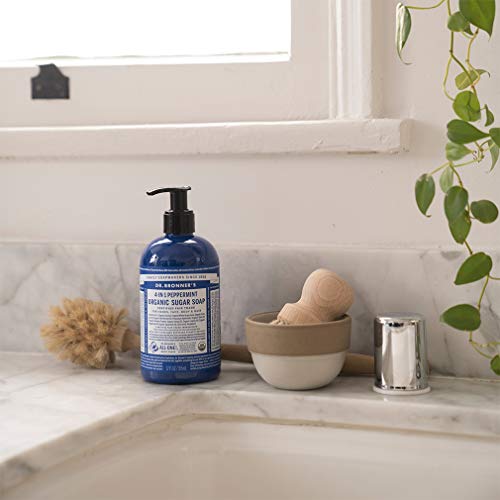
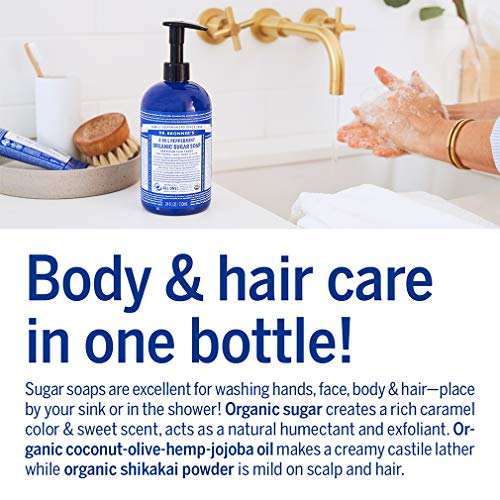
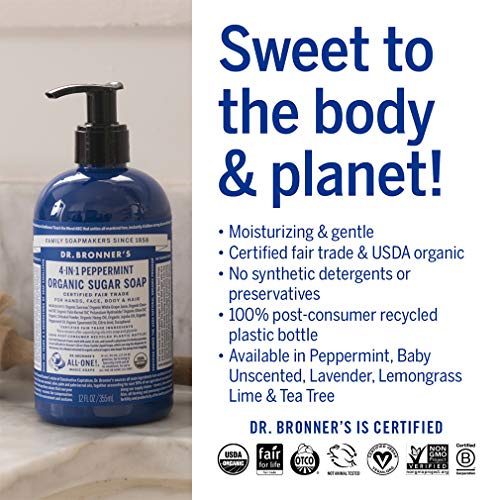
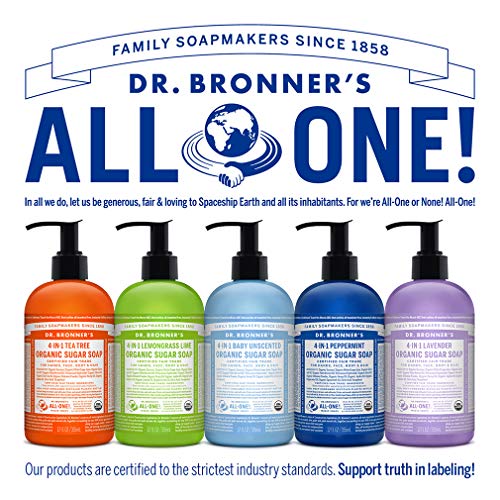
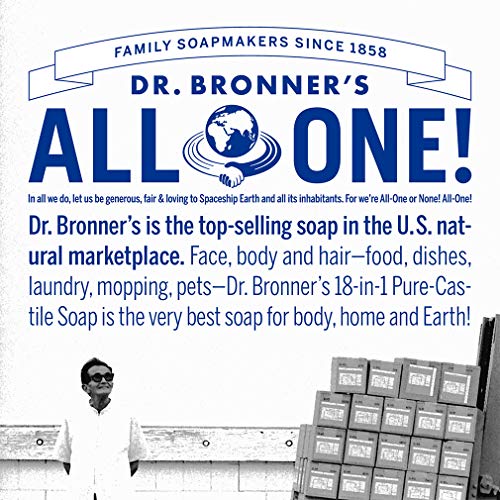
Dr. Bronner's Organic Sugar Soap - Nourishes & Hydrates, Vegan, Non-GMO - Peppermint, 12 oz


Potassium Hydroxide
High RiskPotassium hydroxide is a caustic inorganic base commonly used in various products for its ability to adjust pH levels and act as a cleaning agent. It is highly soluble in water and can produce heat upon dissolution, making it effective in certain formulations.
Sustai Insights
Potassium hydroxide serves as a strong pH adjuster and cleaning agent, but it poses significant health risks due to its caustic nature, which can cause irritation to skin and eyes. Environmental concerns include its potential to contribute to water pollution. Regulatory bodies have imposed strict usage restrictions due to these hazards, leading to a high-risk overall assessment. Safe handling practices are essential, and alternatives such as citric acid may provide safer pH adjustment without the associated risks.
Citric Acid
Medium RiskCitric acid is an alpha hydroxy acid used in personal care products primarily for its role as a pH adjuster and natural preservative. It occurs naturally in citrus fruits and is commonly utilized in various formulations for its chelating properties and mild exfoliation benefits.
Sustai Insights
Citric acid offers functional benefits as an effective preservative and pH stabilizer, contributing to product longevity and stability. It is biodegradable and derived from renewable sources. Health risks are low, with minimal concerns regarding carcinogenicity, allergies, and reproductive toxicity. However, moderate use restrictions exist due to potential irritation at high concentrations. Environmental risks are limited, as citric acid is not known to accumulate in ecosystems. Regulatory agencies have no significant advisories against its use. Overall, it is assessed as a medium-risk ingredient, with safe usage practices recommended and alternatives available.
Cocos Nucifera (Coconut) Oil
Low RiskCocos Nucifera (Coconut) Oil is derived from the kernels of the coconut palm. It is primarily used in cosmetic formulations for its emollient and moisturizing properties, making it suitable for skin and hair care products.
Sustai Insights
Coconut oil serves as an effective moisturizer and emollient, promoting skin hydration and softness. It is sustainably sourced and biodegradable. Health risks are minimal, with low concerns regarding carcinogenicity, allergens, and reproductive toxicity. Environmental impact is also low, as it does not contribute significantly to pollution or bioaccumulation. Regulatory bodies have not issued restrictions on its use. Overall, coconut oil presents a low risk for health and environmental concerns, making it a safe ingredient in cosmetic products.
Simmondsia Chinensis (Jojoba)
Low RiskSimmondsia chinensis, commonly known as jojoba, is an oil derived from the seeds of the jojoba plant. It is commonly used in cosmetic formulations for its moisturizing properties, acting as an emollient and skin conditioning agent.
Sustai Insights
Jojoba oil offers functional benefits such as effective skin moisturization and is biodegradable, with sustainable sourcing practices. Health risks are low, with minimal concerns regarding carcinogenicity, allergies, and reproductive toxicity. Environmental impact is negligible, with no pollutant or bioaccumulation potential. Regulatory status is favorable with no significant restrictions noted. Overall, it is assessed as low risk, and safe usage practices should be maintained. Alternatives include other plant-derived oils like argan or almond oil, which may provide similar benefits.
Tocopherol, D Alpha
Low RiskTocopherol, specifically d-alpha tocopherol, is a naturally occurring form of Vitamin E. It is commonly used in cosmetic and personal care products primarily for its antioxidant properties, helping to protect formulations from oxidation and extend shelf life.
Sustai Insights
D-alpha tocopherol provides effective antioxidant benefits, contributing to product stability. It is sustainably sourced and generally regarded as safe, with low concerns regarding carcinogenicity, allergies, and reproductive toxicity. However, there are minor concerns about endocrine disruption. Regulatory bodies have not imposed significant restrictions, indicating low overall risk. Recommended usage practices include adhering to established safe concentration thresholds. Alternatives, such as other forms of Vitamin E or plant-based antioxidants, may also be considered.
Cocos Nucifera (Coconut) Oil
Low RiskCocos Nucifera (Coconut) Oil is derived from the kernels of the coconut palm. It is primarily used in cosmetic formulations for its emollient and moisturizing properties, making it suitable for skin and hair care products.
Sustai Insights
Coconut oil serves as an effective moisturizer and emollient, promoting skin hydration and softness. It is sustainably sourced and biodegradable. Health risks are minimal, with low concerns regarding carcinogenicity, allergens, and reproductive toxicity. Environmental impact is also low, as it does not contribute significantly to pollution or bioaccumulation. Regulatory bodies have not issued restrictions on its use. Overall, coconut oil presents a low risk for health and environmental concerns, making it a safe ingredient in cosmetic products.
Potassium Hydroxide
High RiskPotassium hydroxide is a caustic inorganic base commonly used in various products for its ability to adjust pH levels and act as a cleaning agent. It is highly soluble in water and can produce heat upon dissolution, making it effective in certain formulations.
Sustai Insights
Potassium hydroxide serves as a strong pH adjuster and cleaning agent, but it poses significant health risks due to its caustic nature, which can cause irritation to skin and eyes. Environmental concerns include its potential to contribute to water pollution. Regulatory bodies have imposed strict usage restrictions due to these hazards, leading to a high-risk overall assessment. Safe handling practices are essential, and alternatives such as citric acid may provide safer pH adjustment without the associated risks.
Simmondsia Chinensis (Jojoba)
Low RiskSimmondsia chinensis, commonly known as jojoba, is an oil derived from the seeds of the jojoba plant. It is commonly used in cosmetic formulations for its moisturizing properties, acting as an emollient and skin conditioning agent.
Sustai Insights
Jojoba oil offers functional benefits such as effective skin moisturization and is biodegradable, with sustainable sourcing practices. Health risks are low, with minimal concerns regarding carcinogenicity, allergies, and reproductive toxicity. Environmental impact is negligible, with no pollutant or bioaccumulation potential. Regulatory status is favorable with no significant restrictions noted. Overall, it is assessed as low risk, and safe usage practices should be maintained. Alternatives include other plant-derived oils like argan or almond oil, which may provide similar benefits.
Tocopherol, D Alpha
Low RiskTocopherol, specifically d-alpha tocopherol, is a naturally occurring form of Vitamin E. It is commonly used in cosmetic and personal care products primarily for its antioxidant properties, helping to protect formulations from oxidation and extend shelf life.
Sustai Insights
D-alpha tocopherol provides effective antioxidant benefits, contributing to product stability. It is sustainably sourced and generally regarded as safe, with low concerns regarding carcinogenicity, allergies, and reproductive toxicity. However, there are minor concerns about endocrine disruption. Regulatory bodies have not imposed significant restrictions, indicating low overall risk. Recommended usage practices include adhering to established safe concentration thresholds. Alternatives, such as other forms of Vitamin E or plant-based antioxidants, may also be considered.
Citric Acid
Medium RiskCitric acid is an alpha hydroxy acid used in personal care products primarily for its role as a pH adjuster and natural preservative. It occurs naturally in citrus fruits and is commonly utilized in various formulations for its chelating properties and mild exfoliation benefits.
Sustai Insights
Citric acid offers functional benefits as an effective preservative and pH stabilizer, contributing to product longevity and stability. It is biodegradable and derived from renewable sources. Health risks are low, with minimal concerns regarding carcinogenicity, allergies, and reproductive toxicity. However, moderate use restrictions exist due to potential irritation at high concentrations. Environmental risks are limited, as citric acid is not known to accumulate in ecosystems. Regulatory agencies have no significant advisories against its use. Overall, it is assessed as a medium-risk ingredient, with safe usage practices recommended and alternatives available.
Experience the refreshing cleanse of Dr. Bronner's Organic Sugar Soap (Peppermint, 12 oz), crafted from USDA organic and fair trade ingredients. This versatile soap is perfect for hands, body, face, and hair, providing a luxurious lather that nourishes and hydrates.
- Nourishing Cleanse: Infused with organic shikakai powder, this soap conditions while cleansing, ensuring skin and hair feel soft and smooth.
- Sustainable Ingredients: Made with fair trade palm kernel oil from smallholder farmers, supporting ethical practices and protecting local habitats.
- Delightful Aroma: The invigorating scent of organic peppermint and spearmint oils transforms your bathing routine into a refreshing experience.
- Eco-Friendly Packaging: Packaged in 100% post-consumer recycled plastic, Dr. Bronner's actively reduces waste and promotes environmental sustainability.
- Versatile Uses: Ideal for washing hands, body, face, and hair—combine with Citrus Hair Rinse for optimal results.
Choose Dr. Bronner's for a clean that cares for your skin and the planet.
Subscribe & Save with Sustai
- Best Price Guarantee: Always enjoy the lowest prices on sustainable home essentials.
- No Surprises: We’ll notify you before shipping. No hidden fees, ever.
- You’re in Charge: Change, pause, or cancel your subscription anytime with ease.
- Eco-Friendly Deliveries: Our grouped shipments mean less packaging and lower emissions.
Join us on a sustainable journey. Special offers for a limited time! Prices and promotions may change.
Recommended Products
Experience the refreshing cleanse of Dr. Bronner's Organic Sugar Soap (Peppermint, 12 oz), crafted from USDA organic and fair trade ingredients. This versatile soap is perfect for hands, body, face, and hair, providing a luxurious lather that nourishes and hydrates.
- Nourishing Cleanse: Infused with organic shikakai powder, this soap conditions while cleansing, ensuring skin and hair feel soft and smooth.
- Sustainable Ingredients: Made with fair trade palm kernel oil from smallholder farmers, supporting ethical practices and protecting local habitats.
- Delightful Aroma: The invigorating scent of organic peppermint and spearmint oils transforms your bathing routine into a refreshing experience.
- Eco-Friendly Packaging: Packaged in 100% post-consumer recycled plastic, Dr. Bronner's actively reduces waste and promotes environmental sustainability.
- Versatile Uses: Ideal for washing hands, body, face, and hair—combine with Citrus Hair Rinse for optimal results.
Choose Dr. Bronner's for a clean that cares for your skin and the planet.

You can have at most 2 Sustainable Steals products in your cart
Customer Reviews
Customers’ View
Customers appreciate the refreshing and invigorating scent of the Body Soap, particularly the peppermint aroma, which many find pleasant without being overpowering. The quality of the soap stands out, with users noting its ability to cleanse effectively while maintaining skin moisture and softness. Many highlight that it does not dry out their skin and helps in moisture absorption, making it suitable for daily use. Additionally, its organic ingredients resonate well with environmentally conscious consumers, who value the product's safe and nourishing content. Overall, customers find this body soap to be an effective and eco-friendly option that aligns with their health-conscious lifestyle.
AI-generated from the text of customer reviewsThis product has no reviews yet.





